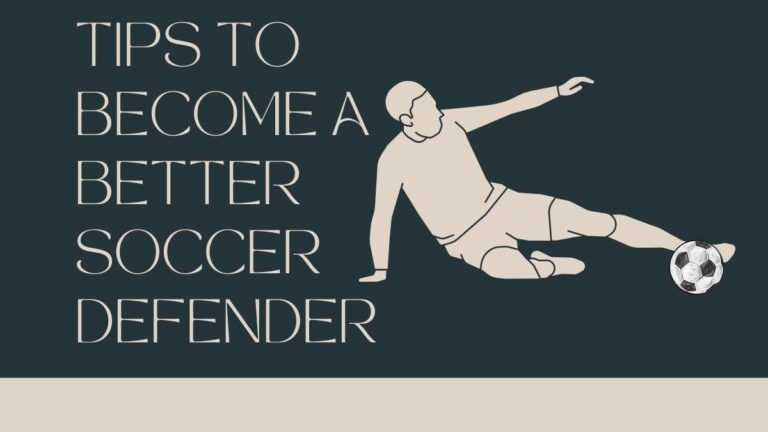The Risks of Overtraining in Soccer and How to Avoid It
Since soccer is a physically demanding sport, players will need a high level of fitness along with excellent technical skills so that they can compete at a higher level. This is why it is important to train consistently and improve your skills regularly. However, some players tend to overdo it and they try to push beyond their physical limits. As a result, these types of soccer players are at risk of overtraining, which can have detrimental effects on their health and performance.
Simply put, overtraining occurs when an athlete engages in excessive training that exceeds their body’s ability to recover. This then leads to physical and psychological effects that affect their overall performance on the field.
In this article, we will explore the risks of overtraining in soccer players and provide tips on how to avoid it. Also, if you want to learn about how you can become a better soccer player, then make sure to read our guide on how to get better at soccer.
What is Overtraining?

Overtraining is a condition that occurs when an athlete trains excessively but is not able to recover properly. Overtraining usually comes with physical and psychological stress that can negatively affect the player’s performance and overall health. In soccer, overtraining happens when players train too frequently, too intensely, or without adequate rest and recovery time.
While regular training is essential for player development, overtraining can cause various symptoms that can ultimately hinder an athlete’s progress. Physical symptoms of overtraining in soccer players may include fatigue, muscle soreness, decreased performance, and increased risk of injury.
Psychological symptoms, on the other hand, may include irritability, decreased motivation, insomnia, and mood swings. These symptoms can impact not only an athlete’s physical performance but also their mental health and well-being.
It’s important to note that overtraining can occur at any level and at any age group. Therefore, soccer players must understand the risks of overtraining and take the necessary steps to prevent it.
Signs and Symptoms of Overtraining in Soccer

Overtraining can cause a range of physical and psychological symptoms that can affect an athlete’s performance and overall health. The players need to be aware of these signs to identify if they’re overtraining. They will then be able to take steps to fix their training schedules and make them optimal for their sake. Here are some common signs and symptoms of overtraining in soccer:
Physical Symptoms
- Fatigue and lack of energy
- Muscle soreness and stiffness
- Decreased performance
- Increased risk of injury
- Elevated resting heart rate
- Decreased appetite
Psychological Symptoms
- Irritability and mood changes
- Decreased motivation
- Insomnia or difficulty sleeping
- Anxiety and depression
- Lack of concentration and focus
It’s important to note that these symptoms may not always be immediately apparent and may develop gradually over time. Therefore, soccer players should regularly monitor their physical and psychological state to detect early signs of overtraining.
Additionally, coaches and trainers can do their part by observing athletes during training and games. They should carefully monitor their performance, energy levels, and mood so that they know if any of their players are overtraining or not.
If a soccer player is experiencing any of these symptoms, they should immediately take a break from training and get some rest. They could also consult with their coach or trainer to assess their training program and make any necessary adjustments. There are also numerous other ways how you can prevent overtraining, which we will discuss later in this article.
Causes of Overtraining in Soccer
Overtraining in soccer can be caused by a range of factors, including training volume, intensity, and recovery time. Here are some common causes of overtraining in soccer:
Lack of Rest and Recovery
This might just be the number one cause behind overtraining among athletes. Rest and recovery are extremely important for allowing the body to repair and rebuild after training. Soccer players who don’t get enough rest or recovery time between training sessions may be at risk of overtraining.
Players who are getting less sleep are usually prone to physical and mental fatigue. Moreover, they also show signs of decreased performance as well as an increased risk of injury. Since soccer is such a physically demanding sport, it requires the same levels of rest and recovery for your body to get used to the intensity.
Poor Nutrition and Hydration

This is another important reason why soccer players feel like they’re overtraining. Proper nutrition and hydration are essential for supporting the body’s recovery and repair processes. Soccer players who don’t consume enough calories, protein, and other essential nutrients can be at risk of overtraining. Therefore, it is important for athletes to follow a well-balanced diet so that they’re getting all the nutrients they require.
High Training Volume
One of the most common causes of overtraining in soccer is training volume, which refers to the amount of training a player engages in over a given period. Soccer players who train too frequently, for too long, or without adequate rest and recovery time between sessions may be at risk of overtraining. High training volume can cause physical and mental fatigue, increase the risk of injury, and reduce overall performance.
High Training Intensity

Training intensity refers to the level of effort exerted during training. Soccer players who engage in high-intensity training, such as sprinting or high-intensity interval training (HIIT), may be prone to overtraining if they don’t focus on rest and recovery. Yes, HIIT is required to improve your fitness levels but it can do more harm than good if you’re not focusing on rest, recovery, and nutrition.
Indulging in high-intensity training can cause muscle soreness and fatigue. So, it is important for your body to get ample rest so that it can recover and come back stronger from such intense exercises.
Personal Factors
Personal factors such as stress, anxiety, and lack of sleep can also contribute to overtraining in soccer. These factors can increase the risk of physical and mental fatigue, decreased performance, and an increased risk of injury.
The Importance of Rest and Recovery in Preventing Overtraining

Rest and recovery are essential components of any training program, especially in high-intensity sports like soccer. Adequate rest and recovery time between training sessions is crucial for allowing the body to repair and rebuild itself, reducing the risk of injury, and preventing overtraining. Here’s why rest and recovery are so important:
Muscle Repair and Growth
During rest and recovery periods, the body repairs and rebuilds damaged muscle tissue. This is essential for muscle growth and development, which is critical for improving performance and reducing the risk of injury.
Reduced Risk of Injury
Rest and recovery are essential for preventing injuries in soccer. Overtraining can cause fatigue, muscle soreness, and decreased coordination, increasing the risk of injury. Rest and recovery allow the body to recover and reduce the risk of injury.
Improved Performance
Proper rest and recovery can improve performance in soccer. Rest allows the body to recover and replenish energy stores. Moreover, you will feel a lot fresh if you’re getting proper rest. This will ultimately translate into the field because you will be able to perform at your best.
Mental Health
Rest and recovery are also important for mental health. Overtraining can cause mental fatigue, anxiety, and depression, which can negatively impact performance and overall well-being. Rest and recovery can reduce stress levels and improve mental health.
To prevent overtraining in soccer, players should incorporate adequate rest and recovery time into their training program. This includes taking rest days, getting enough sleep, and using recovery techniques such as stretching, foam rolling, and massage.
Coaches and trainers can also help by monitoring training volume and intensity and adjusting training programs to allow for proper rest and recovery. By prioritizing rest and recovery, soccer players can reduce the risk of overtraining and improve their performance and overall well-being.
Other Ways of Preventing Overtraining in Soccer
In addition to incorporating rest and recovery time into a soccer training program, there are other ways to prevent overtraining. Here are some additional tips to help prevent overtraining in soccer:
Vary Training Intensity
Soccer players should vary the intensity of their training sessions to prevent overtraining. They should include low-intensity workouts for active recovery and building a base level of fitness, moderate-intensity workouts for improving cardiovascular fitness, and high-intensity workouts for improving speed, power, and agility.
For example, a player could do yoga on Monday for recovery, a 30-minute run on Tuesday at a steady pace, interval training on Wednesday, small-sided games on Thursday, and a leisurely bike ride on Friday. Varying the intensity of training can improve overall performance while reducing the risk of overtraining and injury.
Focus on Nutrition
As mentioned earlier, proper nutrition is quite important when it comes to not overtraining in soccer. By consuming the right types of nutrients in adequate amounts, athletes can support their training and performance by a lot.
Soccer players should focus on consuming a well-balanced diet that includes plenty of lean protein, complex carbohydrates, healthy fats, and a variety of fruits and vegetables. Lean protein sources such as chicken, fish, and tofu help repair and rebuild muscle tissue.
Complex carbohydrates such as whole grains, fruits, and vegetables provide the body with energy. Healthy fats such as avocado, nuts, and olive oil help with hormone regulation and provide essential nutrients. Fruits and vegetables provide important vitamins and minerals that are essential for optimal health.
Hydrate
Staying properly hydrated is essential for preventing overtraining in soccer. Dehydration can cause fatigue, muscle cramps, and decreased coordination, increasing the risk of injury. To stay properly hydrated, soccer players should aim to drink enough water and electrolyte-rich fluids before, during, and after training sessions.
Water is the best fluid for hydrating the body, and soccer players should aim to drink at least eight to ten glasses of water per day. During training sessions, soccer players should drink water or electrolyte-rich sports drinks to replace fluids lost through sweat. After training, players should continue to drink water and fluids to replenish lost fluids and support muscle recovery.
Listen to Your Body
Soccer players need to listen to their bodies and recognize when they need rest or a break from training. Pushing through pain or fatigue can lead to overtraining and injury. If a player feels overly fatigued or experiences persistent muscle soreness, they should consider taking a rest day or reducing training intensity.
Set Realistic Goals
Setting realistic training goals can help prevent overtraining in soccer. For example, let’s say a soccer player wants to increase their endurance and reduce their risk of injury. Instead of jumping into a high-intensity training program right away, they could set a realistic goal of gradually increasing their training volume and intensity over time.
The player could start by increasing their training time or distance by 10% each week and gradually increasing the intensity of their workouts. By setting small, achievable goals and gradually increasing the intensity of their training over time, the player can avoid overtraining and reduce their risk of injury.
Another example of setting realistic goals is focusing on skill development. A player could set a goal of mastering a new skill, such as a new dribbling technique or passing strategy. By focusing on one specific skill at a time and breaking it down into manageable steps, the player can make steady progress without overtraining or risking injury.
Final Thoughts
Overtraining in soccer is a real concern for athletes, coaches, and trainers alike. The risks of overtraining can lead to decreased performance, fatigue, injury, and burnout. However, there are ways to prevent overtraining and promote healthy training habits.
By following these strategies, soccer players can help prevent overtraining and improve their overall health and well-being. Remember, mental toughness is just as important as physical toughness when it comes to soccer performance. So, if you’re looking to improve your mental toughness, be sure to check out our article on how to train your mind for soccer.







